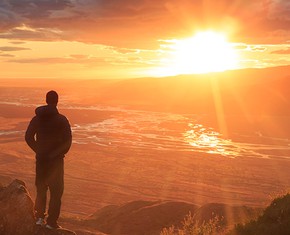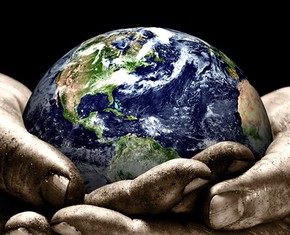The views expressed in our content reflect individual perspectives and do not represent the authoritative views of the Baha'i Faith.
Violent death, gory death, tragic death, death in war, death by pandemic, death by terror, death by not-so-natural disaster, death by monsters, werewolves, ghouls, zombies and giant insects, death from bad guys and robots and spies and serial killers and evil dolls and cartoon characters and superheroes – Hollywood loves death in just about every imaginable form. Only one caveat – it can’t be real.
Of course, Hollywood didn’t invent all that fake death. Shakespeare and Milton did. The great dramatists realized early that our most emotionally taxing moment as human beings centers around dying. Whether it’s our own death or the death of a loved one or the death of the hero in the story, death matters.
But up until now, real human death has been the ultimate Hollywood taboo. Perhaps that’s why audiences flock to high-body-count films, so they can vicariously get close – but not too close – to the experience of leaving this physical world. Very few documentaries deal with the subject, and those that take an unflinching look at death have not, to say the least, achieved great popularity.
Until now. On May 20th, the International Academy of Digital Arts and Sciences presents its Webby Awards, and the People’s Voice Award for Best Documentary Series on the web goes to Wayfarer Entertainment’s Baha’i-inspired films entitled My Last Days – which document profound stories of life told from the perspective of the dying.
These inspiring, touching, tear-inducing stories of life’s ultimate journey have become the surprise of the decade for the film, web and TV industry, garnering multiple awards and heavy mainstream media attention from across the globe. In fact, Wayfarer’s powerful documentaries, led by the story of Zach Sobiech, became the most popular documentary series on all of YouTube last year, tenderizing the hearts of millions of people, helping Soul Pancake (The co-production/distribution channel) accelerate to over a million subscribers in just a few years, and crashing well-known positive media curator Upworthy’s site in the process. How did that happen?
 Justin Baldoni, the founder of Wayfarer Entertainment and the creator of the series, explains:
Justin Baldoni, the founder of Wayfarer Entertainment and the creator of the series, explains:
“I was inspired by Baha’u’llah’s writings, especially in The Hidden Words – ‘I have made death a messenger of joy to thee.’ I wanted to inspire people with that profound idea. How could death be joyful? I was drawn to be near the dying to try and understand the mystery, but more importantly to remind others that we are all on borrowed time, and we shouldn’t have to wait to find out were dying to start living.”
O SON OF THE SUPREME!
I have made death a messenger of joy to thee. Wherefore dost thou grieve? I made the light to shed on thee its splendor. Why dost thou veil thyself therefrom? – Baha’u’llah, The Hidden Words, p. 11.
Baldoni’s production company specializes in developing unscripted television, digital and film content. They’ve done commercials, a feature length documentary, music videos and multiple short documentary films on subjects as diverse as death, homelessness and faith. At first, he explains, “people scoffed at the idea of a series on young people facing their own untimely deaths – but as soon as I pitched it to my friends at Soul Pancake, their eyes lit up and they knew it would be a risky but worthwhile shot at creating some important content. They were on a mission to create content that matters, and it wouldn’t be long before hundreds would donate their time and energy to the project over the next year and a half of filming.
“We’ve done seven My Last Days documentaries now, with an eighth film following up with Zach’s family a year after his passing. It’s strange… we thought initially that it would be a service to those who were dying and their families. But it turned out to be a transformational experience for everyone. We learned so much, we made some of the closest and most intense friendships of our entire lives, we found out that these films served as healing mechanisms for not only these families, but for ourselves. Through this process, we got to discover the beauty and the pain and yes, most importantly the joy of souls moving out of this world and into the next spiritual existence. The show gave us a platform to help some amazing individuals leave a legacy, and touch the hearts of millions around the world”
Baldoni began his career in Hollywood as an actor, but soon realized that he wanted more than what the typical film industry fare could offer. “I asked myself ‘Why am I doing this?’ and knew I wanted to tap into the wisdom of the Baha’i writings to offer people a sense of hope and joy — and that experience of being a true seeker. Our work is seen as a service in the writings, and if done with pure motive in the eyes of God it is even seen as prayer. Baha’u’llah says in The Seven Valleys that we should all be wayfarers in the path of spiritual truth, so that’s what we decided to name the organization. And we’re not all Baha’is – I have a Muslim business partner, for example, who truly understands the universal nature of the kinds of questions we’re asking.”
Baldoni says his ultimate goal at Wayfarer, with every project they undertake, is “to elevate the human spirit. We want everyone to have the experience we’ve had with the dying and their families and friends. We want everyone to feel that deep connection we’ve had the privilege of feeling and in the process bring a deeper sense of purpose and heart to television and film that will hopefully inspire us all to rise to the occasion and leave this world better than when we found it.”


















Comments
Sign in or create an account
Continue with Googleor